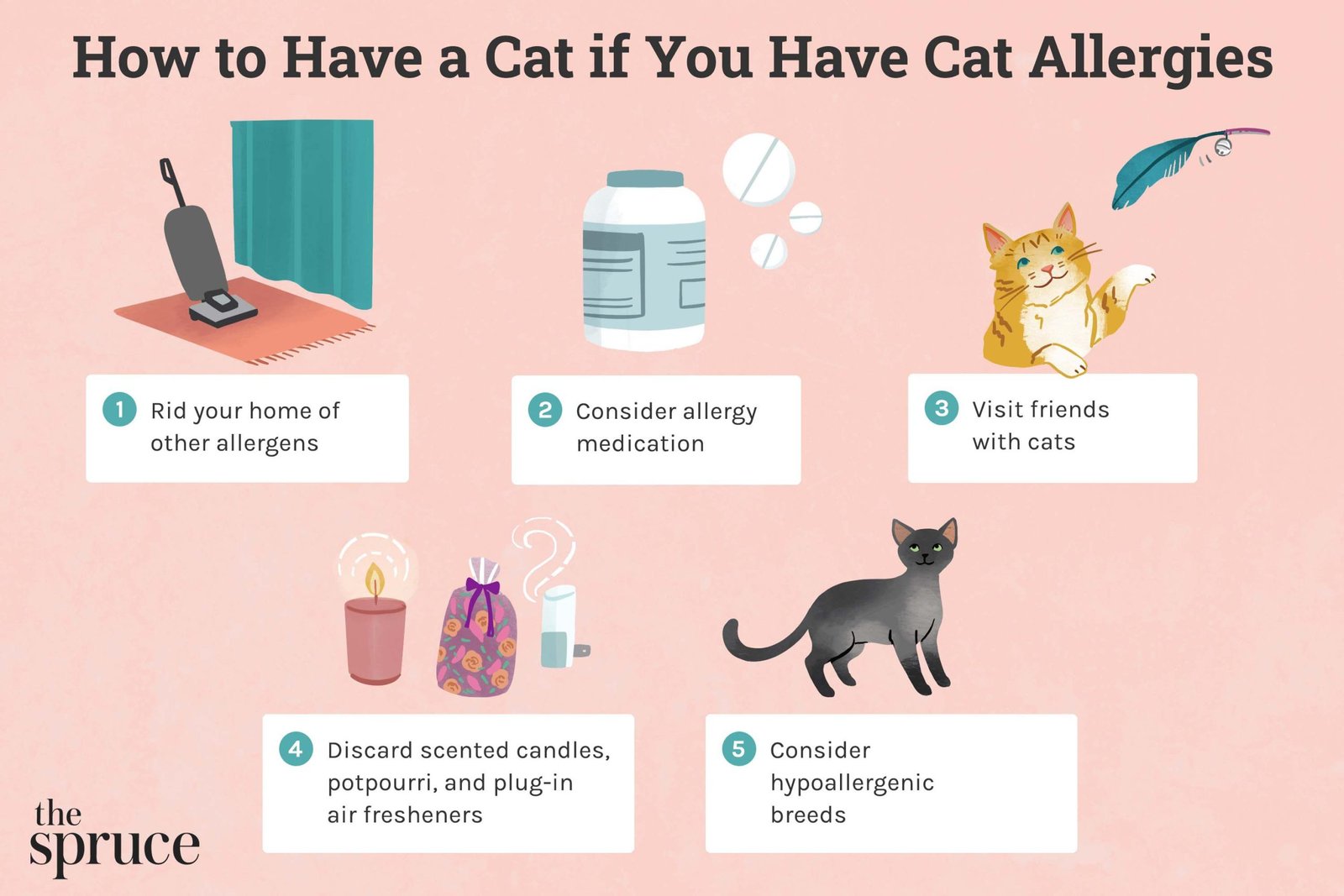To have a cat if you have cat allergies, choose a cat breed with fewer allergy-inducing dander and skin, undergo allergy testing and consider immunotherapy to desensitize your immune system to cat allergens. By following these steps, you can manage your allergies while still enjoying the company of a furry friend.

Credit: www.petassure.com
Understanding Cat Allergies
If you have cat allergies but still want to have a cat, there are options for managing and reducing your allergies. From choosing hypoallergenic cat breeds to implementing allergy prevention techniques, it is possible to have a cat while effectively managing your allergies.
What Are Cat Allergies?
Cat allergies are allergic reactions triggered by exposure to proteins found in a cat’s skin cells, saliva, or urine. These proteins, known as allergens, are not harmful themselves, but they can cause the immune system of sensitive individuals to overreact, leading to various allergic symptoms. Cat allergies are one of the most common types of pet allergies and can affect both children and adults.Causes Of Cat Allergies
The primary cause of cat allergies is the body’s misguided immune response to the allergens present in a cat’s dander, saliva, or urine. When a person with a cat allergy comes into contact with these allergens, the immune system produces chemicals, such as histamine, to fight off the perceived threat. These chemicals are responsible for the uncomfortable symptoms associated with cat allergies, including sneezing, itching, wheezing, and watery eyes.Symptoms Of Cat Allergies
The symptoms of cat allergies can vary from person to person, but commonly include: 1. Sneezing: Many individuals with cat allergies experience frequent sneezing upon exposure to cat allergens. 2. Itchy or Watery Eyes: Cat allergens can cause the eyes to become red, itchy, and watery. 3. Runny or Stuffy Nose: Allergens can trigger a runny or congested nose, making breathing difficult. 4. Skin Rash: Some people may develop a red, itchy rash (hives) on areas of the skin that come into contact with cat allergens. 5. Coughing and Wheezing: Exposure to cat allergens can lead to coughing and wheezing, especially in individuals with asthma. 6. Difficulty Breathing: In severe cases, cat allergies can cause shortness of breath or difficulty breathing, requiring immediate medical attention. If you suspect you have cat allergies, it’s essential to consult with an allergist for proper diagnosis and personalized treatment options. Understanding the symptoms and causes of cat allergies is the first step towards effectively managing them and enjoying the companionship of a cat, even if you have allergies.Managing Cat Allergies
If you have cat allergies, there are ways to manage them and still have a cat. You can reduce exposure to allergens, choose hypoallergenic cat breeds, and undergo allergy testing for potential solutions.
Reducing Exposure To Cat Allergens
If you have cat allergies but still want to have a feline companion, there are certain steps you can take to reduce your exposure to cat allergens. By minimizing allergens in your environment, you can help alleviate your symptoms and enjoy the company of your furry friend. Here are some tips to reduce exposure:
- Keep your cat out of your bedroom, as this is where you spend a significant amount of time.
- Invest in an air purifier with a HEPA filter to trap and remove allergens from the air.
- Regularly clean your home by vacuuming and dusting to remove any allergens that may have settled.
- Wash your hands after playing with your cat to minimize the transfer of allergens to your face and body.
- Consider using allergen-proof covers for your bedding and pillows to create a barrier between you and any allergens.
- Install high-efficiency furnace filters to help capture allergens in your home.
Medical Treatments For Cat Allergies
If reducing exposure to cat allergens isn’t providing enough relief, there are various medical treatments available that can help manage your cat allergies. These treatments aim to alleviate symptoms and improve your overall quality of life. Here are some medical treatments you can consider:
- Antihistamines: These medications can help reduce itching, sneezing, and runny nose caused by allergies.
- Nasal sprays: Prescription nasal sprays can help control nasal congestion and inflammation.
- Allergy shots: Also known as immunotherapy, allergy shots can help desensitize your immune system to cat allergens over time, reducing your allergic response.
Immunotherapy For Cat Allergies
One of the most effective long-term treatments for cat allergies is immunotherapy. This treatment involves regular injections of small amounts of cat allergens, gradually desensitizing your immune system to the allergen. Over time, your immune system becomes less reactive, leading to a decrease in allergic symptoms. Immunotherapy is a long-term commitment, often requiring several years of treatment, but it has proven to be highly effective in reducing allergies in many patients.
Owning A Cat With Allergies
Have cat allergies but still want to own a cat? There are ways to manage and reduce allergies, such as choosing allergy-friendly cat breeds, regularly brushing your cat, and keeping your home clean. With proper care and precautions, you can enjoy the companionship of a cat even if you have allergies.
Owning a Cat with AllergiesChoosing The Right Cat Breed
If you have cat allergies but still want to enjoy the companionship of a furry friend, choosing the right cat breed is essential. Some cat breeds produce fewer allergens or have hypoallergenic qualities that make them more suitable for allergy sufferers. Consider breeds such as Cornish Rexes, LaPerm, Oriental Shorthairs, and Devon Rex, as they tend to have less allergy-inducing dander and skin. However, it’s crucial to note that individual reactions to specific breeds can vary, so it’s always a good idea to spend time with a cat of the chosen breed before making a final decision.Creating An Allergy-free Environment
To minimize allergic reactions and create a more comfortable living space for both you and your feline companion, it’s crucial to create an allergy-free environment. Here are some tips to help you achieve this:- Designate certain areas of your home as off-limits to your cat, such as your bedroom or a specific room where you spend a significant amount of time. This allows you to have a safe space free from allergens.
- Invest in a high-quality air purifier with a HEPA filter to help remove allergens from the air.
- Regularly clean your home, paying extra attention to areas where your cat spends the most time. Vacuuming carpets, dusting surfaces, and washing bedding regularly can help reduce allergens.
- Consider using hypoallergenic bedding and furniture covers to minimize exposure to allergens.
Tips For Living With A Cat Allergy
Living with a cat allergy can be challenging, but with the right approach, it’s possible to coexist harmoniously. Here are some tips to help you manage your cat allergy:- Keep your cat’s living space clean and free from allergens by regularly grooming them. Brushing your cat’s fur can help remove loose hair and dander that can trigger allergies.
- Wash your hands thoroughly after interacting with your cat to minimize the transfer of allergens to other areas of your body.
- Consider using allergy medications or nasal sprays recommended by your doctor to alleviate allergy symptoms.
- Consult with an allergist to explore immunotherapy options, such as allergy shots or sublingual tablets, which can help build tolerance to the allergens over time.
:strip_icc()/controlling-cat-allergies-553869-hero-f2a831a5af0e4fb7aa1614493e7d31b5.jpg)
Credit: www.thesprucepets.com

Credit: www.wikihow.com
Frequently Asked Questions On How To Have A Cat If You Have Cat Allergies
Can I Live With A Cat If I Have A Cat Allergy?
If you have a cat allergy, you can still live with a cat by managing your allergies. Reduce exposure to allergens and treat symptoms to keep your pet. Choosing a breed with less allergenic dander, undergoing allergy testing, and desensitization through immunotherapy can also help.
Can I Get A Cat If Allergic To Cats?
Yes, you can still get a cat if you’re allergic. Choose cat breeds with lower levels of dander like Cornish Rexes, LaPerm, Oriental Shorthairs, or Devon Rex. You can also undergo allergy testing and use immunotherapy to build tolerance to cats.
Manage your allergies with medication and keep a clean environment to reduce allergens.
Can You Still Own A Cat If You’re Allergic?
If you’re allergic to cats, you can still own one depending on the nature of your allergies. If your symptoms are mild, like sneezing and watery eyes, you may be able to build up tolerance gradually. However, it’s important to undergo allergy testing and consult a doctor, especially if you have asthma.
You can also consider hypoallergenic cat breeds with lower allergen levels.
Can You Get Used To A Cat If You Have Allergies?
Yes, you can get used to a cat if you have allergies. You can retrain your immune system through immunotherapy, which involves repeated exposure to small doses of cat allergens. This desensitizes your body and provides long-term relief from symptoms.
Conclusion
If you have cat allergies but still want to have a furry friend, there are ways to make it work. By reducing exposure to allergens and taking necessary precautions, you can manage your allergies while enjoying the company of a cat.
Choose hypoallergenic breeds, keep your home clean, use air purifiers, and groom your cat regularly to control allergens. Furthermore, consult with your doctor for allergy testing and explore immunotherapy to build up tolerance. With proper management, you can have a cat and minimize the impact of allergies on your lifestyle.

